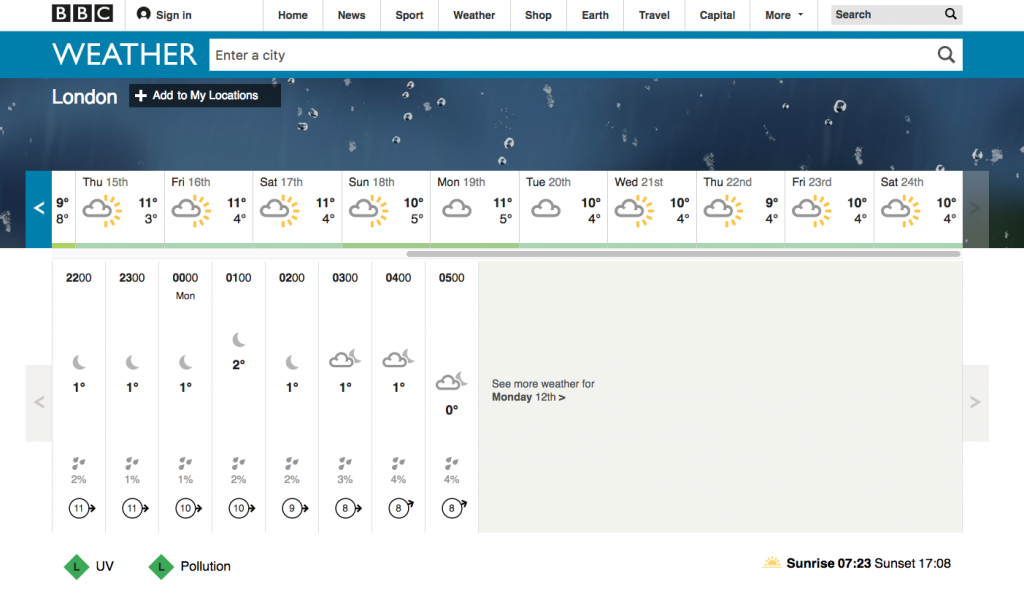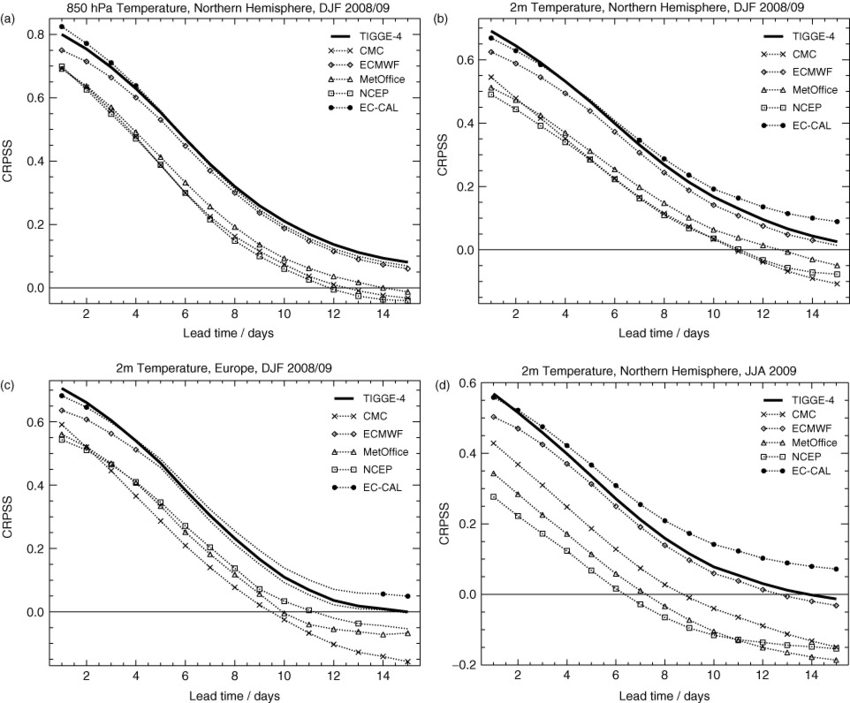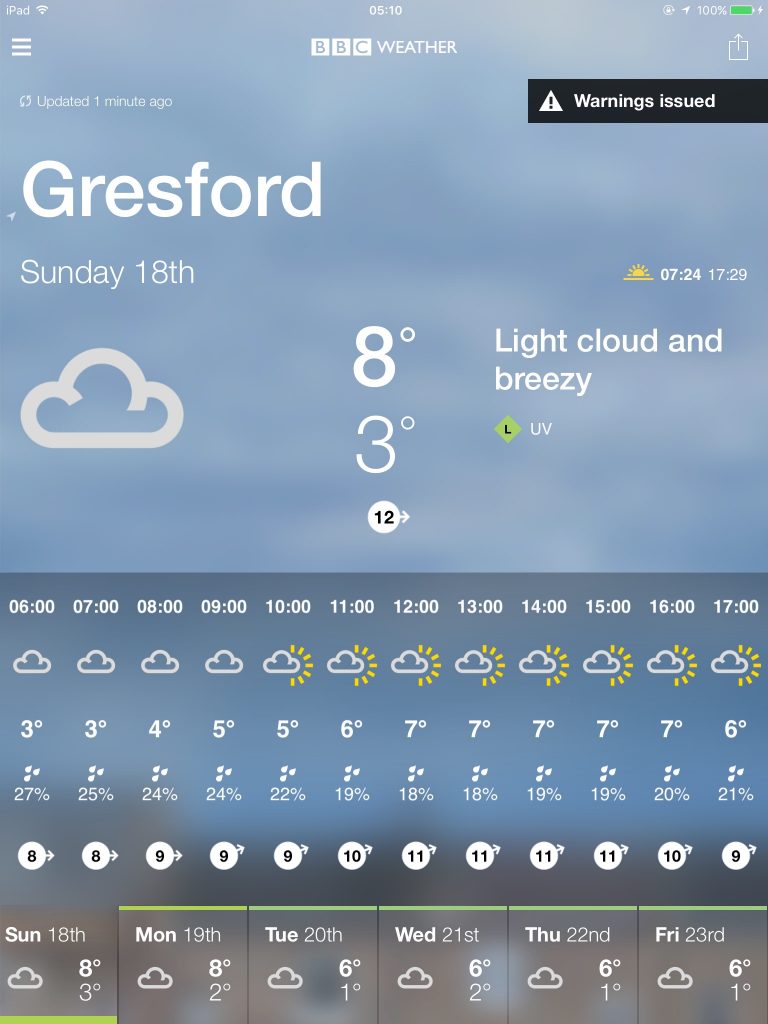12 February 2018
The BBC’s New 14 day Weather Forecasts Are Bollocks
Posted by Dan Satterfield
I have no problem with the BBC dropping the UK Met office for their forecasting and going with a private company. and their new on-air weather graphics are actually quite good.
HOWEVER
Their new 14-day deterministic weathercasts are (in terms the average UK bloke will readily understand) bollocks.

The BBC are also giving hourly forecasts out to 14 days when statistical skill scores show that even a maximum temperature forecast has little skill.
Make no mistake, forecasts are getting better and better. A report (a few years back) estimated that reliable forecasts are increasing by about a day per decade and this seems subjectively right to me. So, the question here is how far out can a reliable forecast go as of 2018? The answer is pretty easy. Look at forecast verification and the skill scores on numerical models.

The skill scores beyond ten days for the ECMWF model (considered the best long-range model by most everyone) show skill falling apart rapidly beyond 7 days.
The answer is about 5-7 days most of the time. Ten days is really pushing it, but there is some skill with a general (warmer/colder/drier) forecast. Forecasting a high of 7° C and a low of 2° with a 30% chance of precipitation 14 days out with a skill that exceeds climatology is not possible. The BBC is not only doing that, but they are posting an HOURLY forecast out to 14 days.
Poppycock.
If the company providing the BBC with weather services has data that says they can beat climatology at 14 days, I’m all ears and will eat my words. Around the world, there is no better news organization than the BBC. They are indeed the gold standard and that is why this matters. This is a nick on their reputation that’s needlessly inflicted, so here’s a suggestion: Talk to the Royal Meteorological Society and get their opinion on how far out they should push their forecasts. If that is not good enough, ask the Royal Society to do a study on it. I am quite confident that it will NOT be anywhere near 14 days.



 Dan Satterfield has worked as an on air meteorologist for 32 years in Oklahoma, Florida and Alabama. Forecasting weather is Dan's job, but all of Earth Science is his passion. This journal is where Dan writes about things he has too little time for on air. Dan blogs about peer-reviewed Earth science for Junior High level audiences and up.
Dan Satterfield has worked as an on air meteorologist for 32 years in Oklahoma, Florida and Alabama. Forecasting weather is Dan's job, but all of Earth Science is his passion. This journal is where Dan writes about things he has too little time for on air. Dan blogs about peer-reviewed Earth science for Junior High level audiences and up.
Hi Dan. Great post! On the last point, the BBC have asked the National Centre for Atmospheric Science in the UK to provide some independent feedback on the new forecasts.
https://www.ncas.ac.uk/en/18-news/2895-ncas-to-monitor-meteogroup-forecasts-for-the-bbc
As a UK bloke, I will make a few comments about our weather – starting with the fact that the British are assumed to be always talking about it. An Ethiopian visitor (who had obviously acquired an English sense of humour during his stay) said that he was warned about the English weather before he came, “It might be hot, cold, wet, dry, or it might snow – but I was not warned that all this can happen in one day!” This is a country where it can be raining at the back of the house and sunny at the front.
Looking at that (rather boring) forecast for Gresford, note that it says that it was updated one minute ago; it will continue to be updated through the day; that promised sunshine might get pushed further and further into the future until it is forecast for the following day. Note that at 10:00 we are promised light cloud with sunny intervals and a 22% chance of rain (the precision in the uncertainty is incredible). That should cover most eventualities! Forecasts for larger areas might refer to light showers that may join together to give longer periods of rain (I love that one) which may turn wintery on high ground. The dangers of too precise predictions are illustrated by the famous Michael Fish forecast where he failed to predict the ‘Great Storm of 1987’.
Any increase in the accuracy of weather forecasts seems to be canceled by the increased unpredictability in the weather due to global warming. We have had ‘long term weather forecasts’ before but they are soon abandoned.
For the benefit of those not familiar with the British English (Who invented that phrase?) vernacular:
Bollocks (noun) nonsense; rubbish (used to express contempt or disagreement, or as an exclamation of annoyance)
This is not to be confused with, ‘The dog’s bollocks’, which means the opposite.